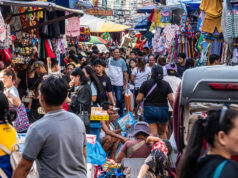Economic expansion to ease — BMI
PHILIPPINE economic growth is expected to moderate until next year — due largely to base effects from 2016’s election-related boost and a “deterioration of the business environment” — but will remain “very respectable” by regional standards, Fitch Group unit BMI Research said in a Jan. 23 note.
“We continue to expect the economy to grow at a more moderate pace over the coming quarters and maintain our real GDP (gross domestic product) forecast at 6.3% in 2018 and 6.2% in 2019,” BMI Research said in a Jan. 23 report.
If realized, BMI’s forecast is slower than the actual 6.7% recorded for 2017 and 2016’s 6.9%, and will fall short of the government’s 7-8% GDP target for 2018 to 2022.
The Fitch unit said that the projections are “still strong by regional and historical standards and this will be supported by positive demographic trends, a strong public infrastructure drive and deepening economic cooperation with China.”
However, BMI flagged a “worsening business environment” that it says will drag private investment growth in the near term.
It noted that fixed capital formation slowed to 10.3% last year from 25.2% in 2016. Broken down, construction growth slowed to 5.7% from 15.1% while expansion of spending on durable equipment slowed to 12.2% last year from 34.5% in 2016.
“In our view, the slowdown in investment is indicative that the Duterte administration’s violent anti-drug war has likely had a negative impact on investor sentiment, while a rise in (US President Donald) Trump’s protectionist rhetoric has led many US investors to adopt a wait-and-see approach with regard to new ventures in locating their business offshore,” BMI said.
“We believe that these concerns will continue to weigh on new investment commitments into the BPO (business process outsourcing) sector in 2018, particularly given that the US is one of the largest investors in the Philippines’ business processing sector.”
Socioeconomic Planning Secretary Ernesto M. Pernia has said that the slowdown of service exports growth in the last quarter for 2017 to 12.6% from 19.9% the preceding year, can be attributed partly to the BPO industry noting that it “is ripe to move into higher value added services.”
Spending — long an anchor of overall economic growth — has also slowed. Household spending growth slowed to 5.8% last year from seven percent in 2016, while increase of state disbursements eased to 7.3% from 8.4% over the same comparative years “largely as a result of base effects due to election spending in 2016.”
BMI said it expects “unfavorable base effects to be carried forward into 2018 and forecast government consumption growth to slow further over the coming quarters.
Still, BMI said that increased foreign investments from close ties with China and Japan, as well as the government’s P8-trillion medium term infrastructure push — to be funded partly by tax reform like the recently enacted Republic Act No. 10963 or the Tax Reform for Acceleration and Inclusion Act (TRAIN) — will sustain the Philippines’ strong economic outlook.
“While growth headwinds are mounting in the near term as the business environment deteriorates, we believe that the Philippine economy will continue to be buoyed by strong demographic trends supporting savings, increased trade and investment links with China and Japan, as well as a strong public infrastructure drive. This should see real GDP growth in the Philippines average above six percent over the medium term,” the Fitch unit said.
“Furthermore, on the fiscal reform front, the government has overhauled the tax system, which is expected to boost government revenue and create a more equitable and efficient tax system. This should allow the government to carry out its ambitious public infrastructure development plans,” BMI said in its note.
“This will likely go some way in improving the country’s poor infrastructure, which has long prevented the Philippines from reaching its growth potential.”
The Department of Finance expects P90 billion in incremental revenues this year from TRAIN, growing to P786.4 billion by 2022.
The law also automatically earmarks 70% of the overall additional revenues to the government’s infrastructure program.
The TRAIN cuts personal income tax as well as estate and donors tax rates,while withdrawing some value-added tax exemptions, raising taxes on fuel, automobiles, tobacco, minerals, coal and documentary stamps, among other items, while slapping new levies on sugar-sweetened beverages and some cosmetic procedures, among others.
It is one of up to five tax reform packages that are cumulatively expected to shoulder up to a fourth of the planned P8-trillion spending on infrastucture until 2022, when Mr. Duterte ends his six-year term. — Elijah Joseph C. Tubayan



